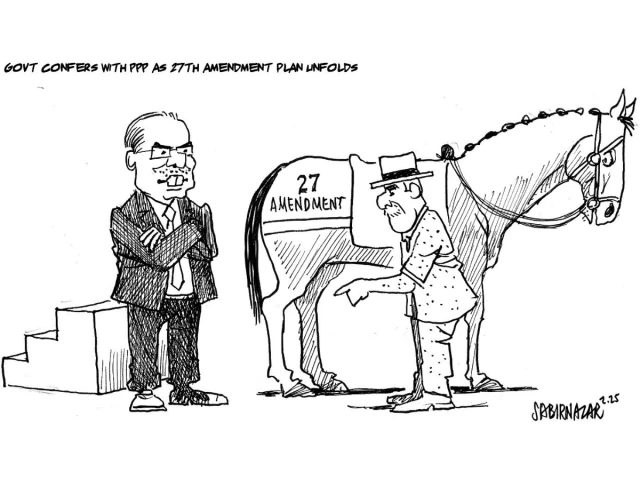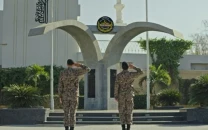27th Amendment — What we know so far
At present, 64 votes are required in the Senate to pass any constitutional amendment

The capital is abuzz with political frenzy as the much-discussed 27th Constitutional Amendment is poised to be tabled in the Senate this Friday.
With the Pakistan Peoples Party (PPP) set to take up the matter during its executive committee meeting slated for tomorrow, two questions appear to dominate all circles: what will the final draft of the Amendment contain, and can it realistically win passage, given the fragile coalition that underpins the current parliamentary set-up?
Deliberations on the 27th Amendment began soon after the 26th Constitutional Amendment was passed in October 2024. Yet, until now, no one could say with certainty what it would entail. On Monday, PPP Chairperson Bilawal Bhutto-Zardari gave the first indication of what it will consist of in a post on X.
PMLN delegation headed by PM @CMShehbaz called on @AAliZardari & myself. Requested PPPs support in passing 27th amendment. Proposal includes; setting up Constitutional court, executive magistrates, transfer of judges, removal of protection of provincial share in NFC, amending…
— Bilawal Bhutto Zardari (@BBhuttoZardari) November 3, 2025
Based on Bilawal's tweet, the 27th Amendment aims to further reform the judiciary, building on the changes introduced in the 26th Amendment. It proposes the establishment of federal constitutional courts in the provinces, the restoration of executive magistrates, and the transfer of powers to enable judges to move between jurisdictions.
Lawyer Mirza Moiz Baig told The Express Tribune that the proposed changes could undermine judicial independence. “The proposed amendments to Article 200, which remove the requirement of obtaining a judge’s consent before transferring them, leave judges vulnerable to executive influence. Similarly, the restoration of executive magistrates would breach the separation of powers guaranteed under Article 175, eroding the independence of the judiciary.”
The Amendment reportedly also seeks to reduce the provincial share under the National Finance Commission (NFC) Award and introduce changes in command and control structures concerning the armed forces and appointments to the Election Commission. Among the key articles under discussion are Articles 8, 199, 200, 234, and 243.
Article 243 pertains to who commands the Armed Forces of Pakistan. It dictates that, "The Federal Government shall have control and command of the Armed Forces".
Read: Shehbaz led PML-N delegation approached PPP to back 27th Amendment: Bilawal
It goes on to state, "without prejudice to the generality of the foregoing provision, the Supreme Command of the Armed Forces shall vest in the President". There is still much ambiguity surrounding what changes are going to be made to this provision enshrined within the Constitution.
"Likewise, the creation of the Federal Constitutional Court packed with judges who ruffle no feathers not only denigrates the Supreme Court into an appellate court but also eviscerates the judiciary’s ability to enforce fundamental rights," said Baig.
“The proposed 27th Amendment will do to the Federation what the 18th Amendment did to save it. Revisiting the provinces’ share in the NFC and curtailing provincial authority would dilute autonomy and undermine the federal character of the Constitution,” he added.
The NFC Award has long been a source of tension between the Centre and the provinces. Successive governments, including the PTI administration, have voiced dissatisfaction with the current distribution formula, under which 57.5% of resources from the federal divisible pool go to the provinces, while the Centre retains 42.5%.
Bilawal revealed that a delegation of the Pakistan Muslim League-Nawaz (PML-N), led by Prime Minister Shehbaz, met with President Asif Ali Zardari and himself to seek the PPP’s support for passing the Amendment.
Much now hinges on the outcome of the PPP’s Central Executive Committee meeting, which is expected to determine the party’s final position.
Read More: Rumours swirl around ‘27th amendment’ amid flurry of high-level meetings
Yasser Kureshi, a researcher at the University of Oxford told The Express Tribune that despite differences between the PML-N and PPP on other points, "there is likely to be consensus among them on taking the next steps in fragmenting and subordinating the judiciary through the 27th Amendment".
He added that debates over judicial independence "are now largely irrelevant, especially since the 26th Amendment. What we need to ask instead is: how does the current regime seek to use and weaponise the judiciary and how does this amendment serve that purpose."
"My understanding is that the judiciary's role is now to act as a rubber stamp, providing legal cover for the executive branch's efforts to organise and consolidate power," said Kureshi.
United front?
Although previous rumours about the 27th Amendment, hinting at President Zardari's ouster and takeover of the presidency by Chief of Army Staff and now Field Marshal Asim Munir, were vehemently denied by both the civil and military leadership, political opinions on the current proposal are conflicting.
Where PML-N MNA Tehmina Daultana stresses that this Amendment is the need of the hour, PPP legislators stand against it.
"This Amendment will strengthen the Centre. It is crucial for the country's progress and development," said Daultana.
On the other hand, PPP MNA Agha Rafiullah told The Express Tribune, "we will not let provinces lose the autonomy [granted under the 18th Amendment] under any circumstances. [Instead] we'll make the 18th Amendment even stronger".
"This is a test for the PPP. Let's see how Bilawal Bhutto handles this situation," said PTI MNA Rana Atif.
The Senate
At present, 64 votes are required in the Senate to pass any constitutional amendment. The PPP holds 26 seats, making it the most dominant party on the government benches, while the PML-N holds 20.
Among the coalition partners, the Balochistan Awami Party (BAP) has four members, and the Muttahida Qaumi Movement (MQM) holds three. Independent senators on the government side include Abdul Karim, Abdul Qadir, Mohsin Naqvi, Anwaar-ul-Haq Kakar, Asad Qasim, and Faisal Vawda.
Foreign Minister Ishaq Dar, addressing the Senate on Tuesday, assured lawmakers that all coalition partners were being consulted and that unity was expected on key votes. "We will move forward in line with the Constitution and the law, giving every member the right to debate and share their opinion," he said. "Allies are being kept informed, and the draft will only be finalised after mutual agreement."
Dar reaffirmed that it was the government's constitutional duty to move amendments transparently and with consensus. "There should be no confusion about who will present the bill," he said. "It is the government's responsibility, and it will be done through parliament, not outside it."
On the opposition benches, Pakistan Tehreek-e-Insaf (PTI) remains the largest party, holding 14 seats, with one newly elected senator expected to take the oath soon. The Awami National Party (ANP) holds three seats, while the Jamiat Ulema-e-Islam (JUI-F) has seven. The Majlis Wahdat-e-Muslimeen (MWM) and the Sunni Ittehad Council (SIC) have one senator each.
The PTI has stated unequivocally that it will not support the 27th Amendment. The Tehreek Tahafuz-e-Aeen-e-Pakistan (TTAP) has announced plans to block all attempts to secure its passage.
Former National Assembly Speaker Asad Qaiser criticised the PPP’s stance, saying, “There was once a PPP of Zulfikar Ali Bhutto, who laid the foundation of the Constitution, and another of Benazir Bhutto, who sacrificed her life for democracy. But today’s PPP is working hard to bury democracy.”
The final step
After the amendments draft is finalised in the Senate, it will move on to the National Assembly for a vote.
The government alliance may hold a two-thirds majority in Parliament, but without the Pakistan Peoples Party’s (PPP) support, the passage of the 27th Constitutional Amendment remains uncertain. So, what is the current party position in the National Assembly, and how many votes are required to approve the amendment?
The National Assembly comprises 336 members, but with 10 seats currently vacant, the total number of sitting members stands at 326. To pass a constitutional amendment, the ruling coalition requires the “golden figure” of 224 votes.
Read more: Govt to table 27th amendment after full coalition consultation, says Dar
At present, the ruling alliance commands the support of 237 members in the National Assembly. The PML-N is the largest party in the coalition with 125 members, followed by the Muttahida Qaumi Movement with 22, the Pakistan Muslim League-Quaid with 5, the Istehkam-e-Pakistan Party with 4, and one member each from the Pakistan Muslim League-Zia, the Balochistan Awami Party, and the National Party. The government also enjoys the backing of four independent members.
PPP, with 74 members, is the second-largest party within the coalition. Its support has been crucial in helping the federal government secure not only a simple majority but also a two-thirds majority when required.
On the other hand, the opposition benches have only 89 members in total. These include 75 independents, 10 members from the Jamiat Ulema-e-Islam (JUI-Pakistan), and one member each from the Sunni Ittehad Council (SIC), the Majlis Wahdat-e-Muslimeen (MWM), the Balochistan National Party-Mengal (BNP-M) and the Pashtunkhwa Milli Awami Party (PkMAP).
Nothing about the 27th constitutional amendment do we know with certainty yet; the draft that will be initially presented on the floor of the Senate on November 7 will, in all likelihood, not be the amendment that will ultimately arrive for a vote in the National Assembly. What we do know is that the burden of passing the 27th constitutional amendment rests on PPP's shoulders, without whom the amendment may never materialise.
With additional reporting by Noor ul Huda Bhurgri.




















COMMENTS (3)
Comments are moderated and generally will be posted if they are on-topic and not abusive.
For more information, please see our Comments FAQ